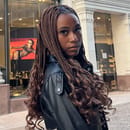Have you ever been scrolling through TikTok and heard a familiar song done by a not-so-familiar artist, or at least not the original singer of the track? No, they did not release a new song or a cover; instead, you’re listening to someone’s AI song cover using the artist’s voice that’s been put through a convertor. The end result can be an amusing combo or unique tune you never knew you wanted to hear (I’m looking at you, “What It Is” by Doechii Ariana Grande AI version). It all seems too good to be true, so how are AI song covers made? And are they even legal?
Gen Z’s obsession with AI-generated content has taken root in recent months and has since spread to the pop culture soundwave. Current examples include the influencer Pinkydoll and TikTok’s live AI/NPC trend, as well as AI converters of LinkedIn-ready headshots and CV images. What I personally believe is a more cool (or creepier, depending on who you ask) approach is the AI cover songs, which have an interesting science behind them. The new wave of AI song covers also speaks to the likelihood of AI ruling the music industry — and let’s just say not everyone is on board with that idea.
How are AI song covers made?
There are several approaches to creating AI song covers, especially if you look on TikTok, but the most common is So-vits-svc. So-vits-svc is a deep-learning AI model that encodes, extracts, and creates cover sounds from audio. The “so” in the name refers for “SoftVC,” which is audio-to-audio modeling; this requires some coding as the machine that you use, often your computer or laptop, breaks down the input audio in frequency bands, making it simpler to pick out the differences in the artist’s voice. After breaking down the frequency for use, the user can utilize this sound to mimic the original voice.
While I am not a coding girlie, and the entire process in technical terms is much lengthier, I was able to research and look into various tutorials that provide a full description of how the system operates. I recommend YouTuber p3tro’s guide or YouTuber JaredJourney’s AI Voice Training using So-Vits-SVC.
Is creating AI song covers legal?
Before you decide to try making an AI audio rendition of one of your favorite songs, keep in mind that it may be more effort than it is worth. According to Billboard, AI-generated songs stand on the verge of crossing an ethical line, with many viewing the act as infringing on copyright.
Additionally, the Recording Industry Association of America, the trade organization that represents the music industry in the United States, has spoken out against internet users creating AI song generation (yikes!), specifically vocal removing websites and “Acapella extractions” — which are the main forms of creating such covers — using their artists’ voices, claiming that it harms them and their work.
According to the statement issued in response to a request from the Office of the United States Trade Representative, the RIAA states, “To the extent these services, or their partners, are training their AI models using our members’ music, that use is unauthorized and infringes our members’ rights by making unauthorized copies of our members works. In any event, the files these services disseminate are either unauthorized copies or unauthorized derivative works of our members’ music.”
Some supporters of AI song covers believe the act should be protected as a kind of free speech. Semafor reported that owners of AI devices could claim fair use rather than copyright infringement.
This is due to the 2015 decision in the Authors Guild v. Google, Inc. case (before I lose you in a tangle of explanations, I promise that it all comes back to AI). The Authors Guild filed a lawsuit against Google, claiming that the use and distribution of their books through the app Google Books was done without the authorization of the rights holders. According to the district court, however, Google’s conduct qualified for fair use under 17 U.S.C. 107. That is to say, it was not infringing on fair use. After all of that, the same could be said for AI song covers; we’ll just have to wait and see.
What are some musicians’ feelings toward AI song covers?
So one of the most important concerns is how musicians feel about these AI song renditions. Not everyone is in favor of fans using their voices as AI singers; most notably, Drake, who reacted to the usage of his voice to create a cover of Ice Spice’s most popular single, “Munch.” He shared an Instagram post by TheShadeRoom about Universal Music requesting that streaming services restrict AI businesses from accessing songs. “This [is] the final straw, AI,” he captioned the Instagram story. So it’s safe to say he’s not a fan of this new wave of AI-generated material.
Other celebrities — while not entirely on board with the concept — have chosen a slightly different approach, deciding that AI will simply enter the music industry regardless. Pharell Williams recently commented on the conversation, saying, “It’s human nature.” He added, “There’s not much you can do, so buckle up.”
Will AI become the future of the music industry?
AI isn’t necessarily a new phenomenon that is being incorporated into the music industry through song covers and actually expands further than that. Danny Wolf, an Atlanta-based producer who has worked with Lil Tecca and Lil Uzi Vert, confirmed to Pitchfork that he does use AI-created tools to assist him in creating song lyrics and tunes.
He acknowledged using ChatGPT to help compose his own upcoming solo album, as well as stating that he used AI to produce a symphony, which he subsequently sampled for an unreleased Juice WRLD collaboration named “Sexual Healing.”
Additionally, we have seen the rise of AI artists, notably K-pop group Aespa — an SM Entertainment girl group known for their futuristic concepts and music style — released a song for their album, My World, in May, which featured a character in their group’s storyline. The song, “Welcome to MY World,” included vocals from the character Nævis, a completely AI-generated singer, on the song’s bridge.
The feature is the first phase in the company’s objective to debut Nævis as a solo performer and the company’s first AI artist. Lee Sung Soo, CEO of SM Entertainment, commented further on Nævis’ debut, saying, “Nævis, who had only appeared so far as a CG image in Aespa’s music videos, is in plans to be shown as an AI artist. She will be an artist born by mobilizing skills for natural movements, newly created voice, and real-time communication.” Lee also stated that Nævis’ voice will be constructed utilizing samples from 12 different voice actors.
With the almost meteoric rise of AI in pop culture, the possibilities of AI within the music industry are limitless, and rather than being concerned about the anxieties associated with this change, I think it’s interesting to tag along for the ride and see if and how it can be incorporated into our favorite and songs and artists!



